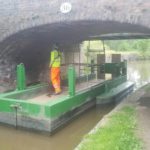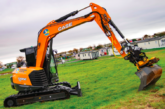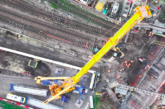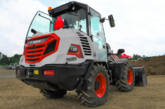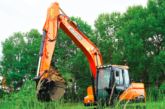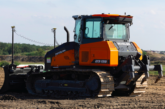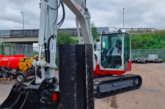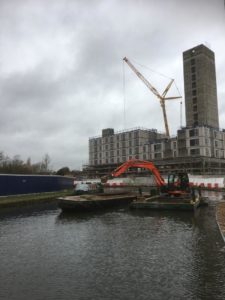 Floating plant may offer a unique solution for contractors struggling to transport material to waterside construction sites in crowded city centres and urban spaces, according to a prominent UK waterway maintenance company.
Floating plant may offer a unique solution for contractors struggling to transport material to waterside construction sites in crowded city centres and urban spaces, according to a prominent UK waterway maintenance company.
Space in London and many other UK cities is increasingly at a premium, yet the appeal of waterfront living, shopping, and dining is as strong as ever. This presents significant challenges to construction companies who are increasingly tasked with projects sited next to water. One such concern is the transportation of construction materials to and from the site, given that the nature of such building works often means that there is limited land access and suitable infrastructure.
According to the Rothen Group, the waterways can offer a solution to such logistical concerns. These canals and rivers can serve as a convenient line of transport for specialised marine vessels that allow construction equipment to get to and operate in awkwardly-located sites. For example, a floating plant can be positioned in the water close to the site, and when combined with a grab barge, is ideal for moving materials into the site and taking waste away.
Ian Rothen, founder of The Rothen Group, a national independent civil engineering business servicing UK waterway, comments: “In many instances, a floating plant can reach sites where roads cannot go. They offer tremendous versatility, and are capable of navigating narrow waterways such as canals, as well as larger bodies of water, including rivers and lakes.”
Even in circumstances where there is land access, the proximity to some of the UK’s oldest canals often brings construction teams into contact with historic towpaths. These were originally designed to bear the weight of horses, and are unsuitable for the heavy lifting of machinery needed for modern building works.
Aside from the potential damage that heavy equipment and debris can cause to towpaths, it is often the case that access alongside canals must be kept open. With construction often taking place in busy towns and cities, pedestrians have to be able to navigate the towpaths, adding further challenges for contractors.
Floating plant equipment can provide the solution to this issue. For almost every aspect of a construction project, there is a marine equivalent. Diggers, cranes, scaffolding, the laying of cables – all of these are possible through the use of floating plant. Furthermore, for canal or riverside properties with elevations facing the water, floating plant can provide a platform from which maintenance can be carried out.
This level of interaction with canals and rivers will be new to many contractors, so it is vital that they seek the support of experienced marine contractors. Ian Rothen concludes: “Far from seeing waterways as the issue, contractors should look at the advantages that using floating plant equipment can provide. Given the specialist nature of this type of work, companies such as The Rothen Group ensure that from initial consultation, to undertaking the works, through to offering a 24-hour response for breakdowns, they are on hand to support construction teams.
“Britain’s waterways were once the arteries of UK industry, and with the rising demand for waterside living, there is every reason to turn to floating plant equipment as a primary asset in construction.”

